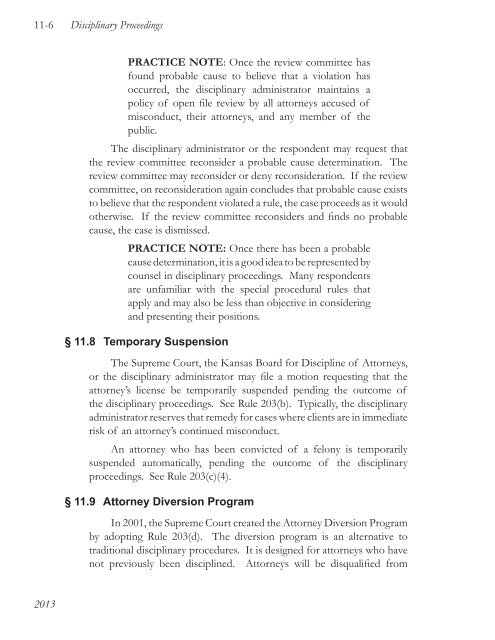CHAPTER 11 - Disciplinary Proceedings - Kansas Judicial Branch
CHAPTER 11 - Disciplinary Proceedings - Kansas Judicial Branch
CHAPTER 11 - Disciplinary Proceedings - Kansas Judicial Branch
You also want an ePaper? Increase the reach of your titles
YUMPU automatically turns print PDFs into web optimized ePapers that Google loves.
<strong>11</strong>- <strong>Disciplinary</strong> <strong>Proceedings</strong><br />
PRACTICE NOTE: Once the review committee has<br />
found probable cause to believe that a violation has<br />
occurred, the disciplinary administrator maintains a<br />
policy of open file review by all attorneys accused of<br />
misconduct, their attorneys, and any member of the<br />
public.<br />
The disciplinary administrator or the respondent may request that<br />
the review committee reconsider a probable cause determination. The<br />
review committee may reconsider or deny reconsideration. If the review<br />
committee, on reconsideration again concludes that probable cause exists<br />
to believe that the respondent violated a rule, the case proceeds as it would<br />
otherwise. If the review committee reconsiders and finds no probable<br />
cause, the case is dismissed.<br />
PRACTICE NOTE: Once there has been a probable<br />
cause determination, it is a good idea to be represented by<br />
counsel in disciplinary proceedings. Many respondents<br />
are unfamiliar with the special procedural rules that<br />
apply and may also be less than objective in considering<br />
and presenting their positions.<br />
§ <strong>11</strong>.8 Temporary Suspension<br />
The Supreme Court, the <strong>Kansas</strong> Board for Discipline of Attorneys,<br />
or the disciplinary administrator may file a motion requesting that the<br />
attorney’s license be temporarily suspended pending the outcome of<br />
the disciplinary proceedings. See Rule 203(b). Typically, the disciplinary<br />
administrator reserves that remedy for cases where clients are in immediate<br />
risk of an attorney’s continued misconduct.<br />
An attorney who has been convicted of a felony is temporarily<br />
suspended automatically, pending the outcome of the disciplinary<br />
proceedings. See Rule 203(c)(4).<br />
§ <strong>11</strong>.9 Attorney Diversion Program<br />
In 2001, the Supreme Court created the Attorney Diversion Program<br />
by adopting Rule 203(d). The diversion program is an alternative to<br />
traditional disciplinary procedures. It is designed for attorneys who have<br />
not previously been disciplined. Attorneys will be disqualified from<br />
2013

















